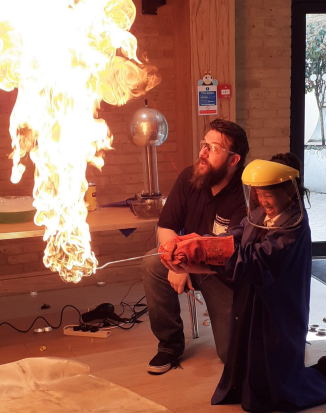Science
 Our Science curriculum aims to develop a sense of excitement and curiosity about natural phenomena and an understanding of how the scientific community contributes to our past, present and future. We want pupils to develop a complex knowledge of Biology, Chemistry and Physics, but also adopt a broad range of skills in working scientifically and beyond; in other words, to think like a Scientist. Studying science allows children to appreciate how new knowledge and skills can be fundamental to solving arising global challenges. Our curriculum is designed so pupils may experience the joy of science and make associations between their science learning and their lives outside the classroom.
Our Science curriculum aims to develop a sense of excitement and curiosity about natural phenomena and an understanding of how the scientific community contributes to our past, present and future. We want pupils to develop a complex knowledge of Biology, Chemistry and Physics, but also adopt a broad range of skills in working scientifically and beyond; in other words, to think like a Scientist. Studying science allows children to appreciate how new knowledge and skills can be fundamental to solving arising global challenges. Our curriculum is designed so pupils may experience the joy of science and make associations between their science learning and their lives outside the classroom.
Our Science curriculum enables pupils to meet the end of key stage attainment targets in the National curriculum and the aims also align with those set out in the National curriculum in Key Stage 1 and 2. For EYFS, the activities allow pupils to work towards the ‘Understanding the World’ Development Matters statements and Early learning goals, while also covering foundational knowledge that will support them in their further history learning in Key stage 1.
Each year, children cover six units of learning in Science. Cross-curricular links are included throughout each unit, allowing children to make connections and apply their Science skills to other areas of learning. Each unit is based upon one of the key science disciplines; Biology, Chemistry and Physics. We have grouped the National curriculum content into six key areas of science: Plants, Animals including humans, Living things and habitats, Materials, Energy, Forces, and Earth and Space. As pupils progress through the school, these key areas are revisited with increasing complexity in our units, allowing pupils to revise and build on their previous learning.
Cross-curricular links are included throughout each unit, allowing children to make connections and apply their Science skills to other areas of learning. Each unit is based upon one of the key science disciplines; Biology, Chemistry and Physics. We have grouped the National curriculum content into six key areas of science: Plants, Animals including humans, Living things and habitats, Materials, Energy, Forces, and Earth and Space. As pupils progress through the school, these key areas are revisited with increasing complexity in our units, allowing pupils to revise and build on their previous learning.
Our science curriculum utilises practical activities that aid in the progression of disciplinary skills and provide opportunities for full investigations. Pupils explore key knowledge and conceptual understanding through engaging activities and an introduction to relevant specialist vocabulary. ‘Working Scientifically’ skills are integrated with conceptual understanding in our activities so children have frequent and relevant opportunities for developing scientific enquiry skills. Our curriculum supports children to: be able to evaluate and identify the methods that ‘real world’ scientists use to develop and answer scientific questions; identify and use equipment effectively to accurately gather, measure and record data; be able to display and convey data in a variety of ways, including graphs; analyse data in order to identify, classify, group, and find patterns; use evidence to formulate explanations and conclusions; and demonstrate scientific literacy through presenting concepts and communicating ideas using scientific vocabulary.
Our Science curriculum supports pupils to:
- Develop a body of foundational knowledge for the Biology topics in the National curriculum: Plants; Animals, Including Humans; Living Things and Their Habitats; Evolution and Inheritance.
- Develop a body of foundational knowledge for the Chemistry topics in the National curriculum: Everyday Materials; Uses of Everyday Materials; Properties and Changes of Materials; States of Matter; Rocks.
- Develop a body of foundational knowledge for the Physics topics in the National curriculum: Seasonal Changes; Forces and Magnets; Sound; Light; Electricity; Earth and Space.
- Be able to evaluate and identify the methods that ‘real world’ scientists use to develop and answer scientific questions.
- Identify and use equipment effectively to accurately gather, measure and record data.
- Be able to display and convey data in a variety of ways, including graphs.
- Analyse data in order to identify, classify, group, and find patterns.
- Use evidence to formulate explanations and conclusions.
- Demonstrate scientific literacy through presenting concepts and communicating ideas using scientific vocabulary.
- Understand the importance of resilience and a growth mind-set, particularly in reference to scientific enquiry.


